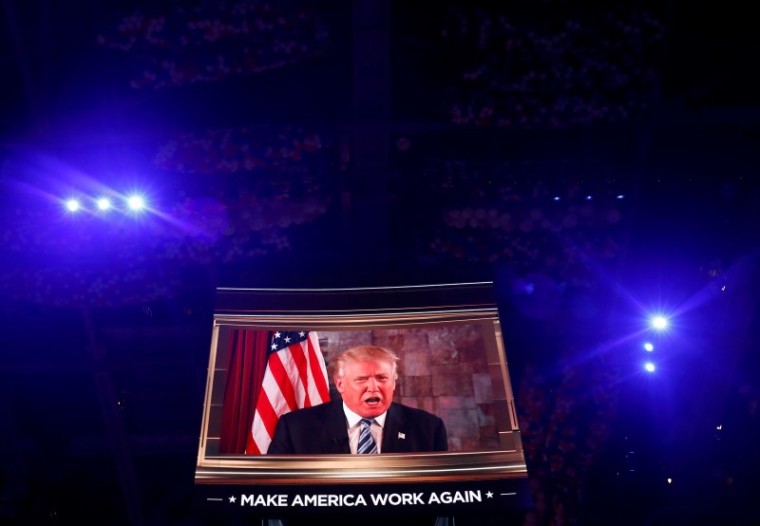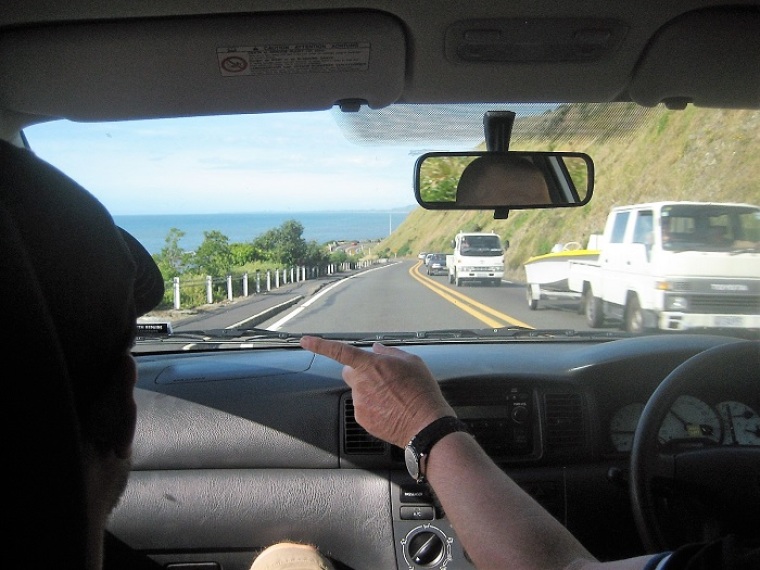

Thirteen months after launching an improbable bid for the White House, Donald Trump captured the 2016 Republican presidential nomination on Tuesday, having vanquished 16 party rivals, warred with much of its establishment and provoked controversy at every turn.
His eldest child, Donald Trump Jr., announced the support of New York, their home state, during a roll-call vote at the Republican National Convention, ensuring Trump had the majority of delegates - 1,237 - needed to contest the Nov. 8 U.S. presidential election against presumptive Democratic nominee Hillary Clinton.
With three of the candidate's other children at his side, the younger Trump said: "It is my honor to be able to throw Donald Trump over the top in the delegate count tonight."
"Congratulations, Dad. We love you," he said.
Trump's Democratic rival, Clinton, was quick to respond, tweeting after the vote: "Donald Trump just became the Republican nominee. Chip in now to make sure he never steps foot in the Oval Office."
Trump won with 1,725 delegates, followed by U.S. Senator Ted Cruz of Texas with 475 delegates, Ohio Governor John Kasich with 120 and U.S. Senator Marco Rubio of Florida with 114. Three other candidates emerged with a total of 12 delegates.
After the presidential vote, the convention by voice vote nominated Indiana Governor Mike Pence, 57, Trump's choice for his vice presidential running mate.
Speaking to the convention for the first time since winning the nomination, Trump appeared on a video screen from New York promising to win the election in November, create jobs, strengthen the military, safeguard U.S. borders and "restore law and order" in the United States.
The state-by-state vote to put Trump's name in nomination took place a day after opponents staged a failed attempt to force a vote opposing his candidacy at the start of the four-day convention, and after a speech by his wife, Melania, drew accusations of plagiarism.
A wealthy New York real estate developer best known to Americans for his starring role in a long-running TV show, "The Apprentice," where his catchphrase was "You're fired," the 70-year-old Trump was a long shot when he entered the race for the Republican nomination more than a year ago, having never held elected office.
On Tuesday, under the headline "Make America Work Again," speakers at Cleveland's Quicken Loans basketball arena were meant to assail Democratic President Barack Obama's record on the economy during his nearly eight years in power.
Instead, speaker after speaker took aim at Clinton, presenting her as out of touch with the concerns of ordinary Americans and the inheritor of Obama's "oppressive" administration.
A former secretary of state under Obama, Clinton, 68, was due to be formally nominated at the Democratic National Convention next week in Philadelphia.
Trump trails Clinton in many opinion polls after a bruising Republican primary season. Trump narrowed his deficit against her to 7 percentage points from 15 points late last week, according to a Reuters/Ipsos poll released on Tuesday.
COMMANDING LEAD
Trump initially refused to rule out an independent run should he fail to win the Republican nomination.
Within weeks of announcing his candidacy at Trump Tower in New York on June 16, 2015, Trump had taken a commanding lead in the Republican race, defying pundits who were quick to write him off and eclipsing the man many had thought would be crowned on Tuesday night - former Florida Governor Jeb Bush, part of a Republican political dynasty.
In a campaign marked by insults and inflammatory rhetoric, Trump tapped into a deep vein of unhappiness running through white Middle America, giving voice to millions who felt left behind in the rush to globalization and who eschewed traditional establishment Republicans like Bush in favor of a brash political outsider who promised to "Make America Great Again".
Opponents branded him a bigot with his calls to temporarily ban the entry of Muslims and to build a border wall with Mexico to keep out illegal immigrants.
Underscoring the problems Trump has faced with U.S. allies abroad, German Foreign Minister Frank-Walter Steinmeier said Trump threatened U.S. and world security with his "politics of fear and isolation."
Steinmeier told Reuters in a written interview that he was concerned about what he called Trump's ambiguous vows to "make America strong again," while simultaneously reducing its engagement overseas.
FOCUS ON ECONOMY, SECURITY
Party officials hope to use the convention to smooth out some of Trump's rough edges and present him as a job creator and a strong hand to combat security threats at home and abroad.
U.S. Senator Jeff Sessions of Alabama, an early backer of Trump, placed his name in nomination, calling him "a warrior and a winner."
Two senior Republicans, U.S. House of Representatives Speaker Paul Ryan and Senate Majority Leader Mitch McConnell, spoke in favor of Trump. Republicans need Trump to do well in the November election as they seek to preserve Republican majorities in Congress.
Security forces were on high alert in Cleveland. Wright State University, a public university near Dayton, Ohio, said on Tuesday it had decided not to host the first U.S. presidential debate scheduled for Sept. 26, citing mounting costs and security concerns. The event will now be held at Hofstra University in New York.
While in Cleveland, Trump ally Chris Christie said on Tuesday that should Trump win the presidency, he would seek to purge the federal government of officials appointed by Obama and could ask Congress to pass legislation making it easier to dismiss public workers.
Christie, who is governor of New Jersey and leads Trump's White House transition team, told dozens of donors the campaign was drawing up a list of federal government employees to fire if Trump defeats Clinton.